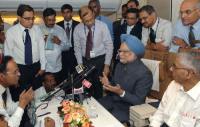The US-India deal is finally complete. Approval from the US Senate last night has set the stage for a serious acceleration of nuclear power use in India.
 |
| Manmohan Singh is the centre of attention on his return from visiting both the USA and France on 30 September |
The American deal comes quick on the heels of an equivalent agreement with France. Both have been made possible by a US-led initiative to end the isolation in nuclear trade that India has experienced since the Nuclear Suppliers Group (NSG) of 45 nations decided to make full-scope safeguards a pre-requisite for nuclear trade in 1992.
As a non-signatory to the Nuclear non-Proliferation Treaty Indian nuclear facilities did not come under such arrangements and this resulted in what prime minister Manmohan Singh called "nuclear apartheid" when speaking in Washington DC last week.
A diplomatic marathon with many, many hurdles
In July 2005 a declaration from Singh and US President George Bush started the work towards ending India's isolation. The text of a proposed deal was amended in the USA by the Hyde Act, and the revised deal then faced a long battle for approval by the Indian parliament. Singh eventually reorganised his coalition government to force the bill through.
India divided its nuclear complex into clear civil and military sectors, and negotiated a safeguards agreement with the International Atomic Energy Agency to ensure the two are kept separate. The final step was a new set of guidelines from the NSG, which made it possible for NSG countries to complete cooperation deals in the way France and the USA now have. Both Russia and the UK are ready to complete cooperation agreements of their own, while many other NSG nations are sure to follow.
Because of America's leadership in the initiative, it had been thought the US-India deal would be signed off before any others. However, delays with the steps above and the turmoil in the failed banking sector pushed the legislation to the very limit of the Senate schedule. It would appear that the deal was meant to have been celebrated during Singh's visit to Washington DC last week. US companies are expected to gain the most from the first round of contracts in India.
A very major near-term benefit for India from the change in trade will be access to secure and plentiful supplies of uranium and nuclear fuel from the international market. India's poor uranium resources have meant that its nuclear generators have often operated below full capacity.






_15863.jpg)







